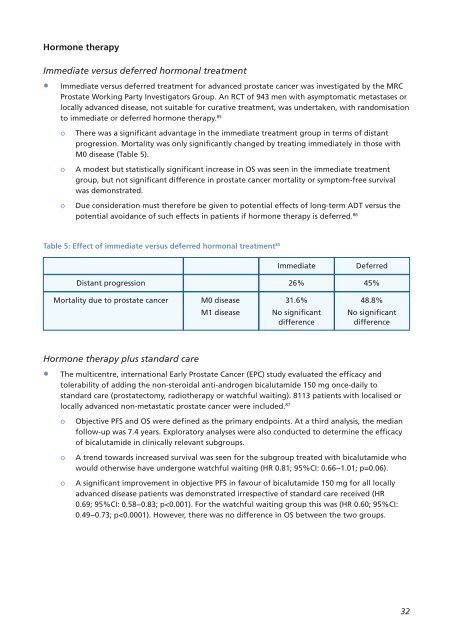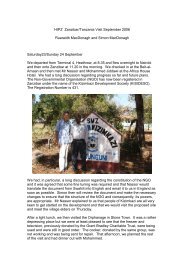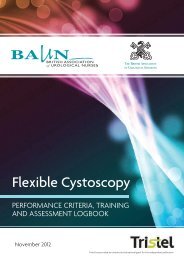MDT (multi-disciplinary team) guidance for managing prostate cancer
MDT (multi-disciplinary team) guidance for managing prostate cancer
MDT (multi-disciplinary team) guidance for managing prostate cancer
Create successful ePaper yourself
Turn your PDF publications into a flip-book with our unique Google optimized e-Paper software.
Hormone therapy<br />
Immediate versus deferred hormonal treatment<br />
• Immediate versus deferred treatment <strong>for</strong> advanced <strong>prostate</strong> <strong>cancer</strong> was investigated by the MRC<br />
Prostate Working Party Investigators Group. An RCT of 943 men with asymptomatic metastases or<br />
locally advanced disease, not suitable <strong>for</strong> curative treatment, was undertaken, with randomisation<br />
to immediate or deferred hormone therapy. 85<br />
o There was a significant advantage in the immediate treatment group in terms of distant<br />
progression. Mortality was only significantly changed by treating immediately in those with<br />
M0 disease (Table 5).<br />
o A modest but statistically significant increase in OS was seen in the immediate treatment<br />
group, but not significant difference in <strong>prostate</strong> <strong>cancer</strong> mortality or symptom-free survival<br />
was demonstrated.<br />
o Due consideration must there<strong>for</strong>e be given to potential effects of long-term ADT versus the<br />
potential avoidance of such effects in patients if hormone therapy is deferred. 86<br />
Table 5: Effect of immediate versus deferred hormonal treatment 85<br />
Immediate Deferred<br />
Distant progression 26% 45%<br />
Mortality due to <strong>prostate</strong> <strong>cancer</strong> M0 disease 31.6% 48.8%<br />
M1 disease No significant No significant<br />
difference difference<br />
Hormone therapy plus standard care<br />
• The <strong>multi</strong>centre, international Early Prostate Cancer (EPC) study evaluated the efficacy and<br />
tolerability of adding the non-steroidal anti-androgen bicalutamide 150 mg once-daily to<br />
standard care (<strong>prostate</strong>ctomy, radiotherapy or watchful waiting). 8113 patients with localised or<br />
locally advanced non-metastatic <strong>prostate</strong> <strong>cancer</strong> were included. 87<br />
o Objective PFS and OS were defined as the primary endpoints. At a third analysis, the median<br />
follow-up was 7.4 years. Exploratory analyses were also conducted to determine the efficacy<br />
of bicalutamide in clinically relevant subgroups.<br />
o A trend towards increased survival was seen <strong>for</strong> the subgroup treated with bicalutamide who<br />
would otherwise have undergone watchful waiting (HR 0.81; 95%CI: 0.66−1.01; p=0.06).<br />
o A significant improvement in objective PFS in favour of bicalutamide 150 mg <strong>for</strong> all locally<br />
advanced disease patients was demonstrated irrespective of standard care received (HR<br />
0.69; 95%CI: 0.58−0.83; p

















